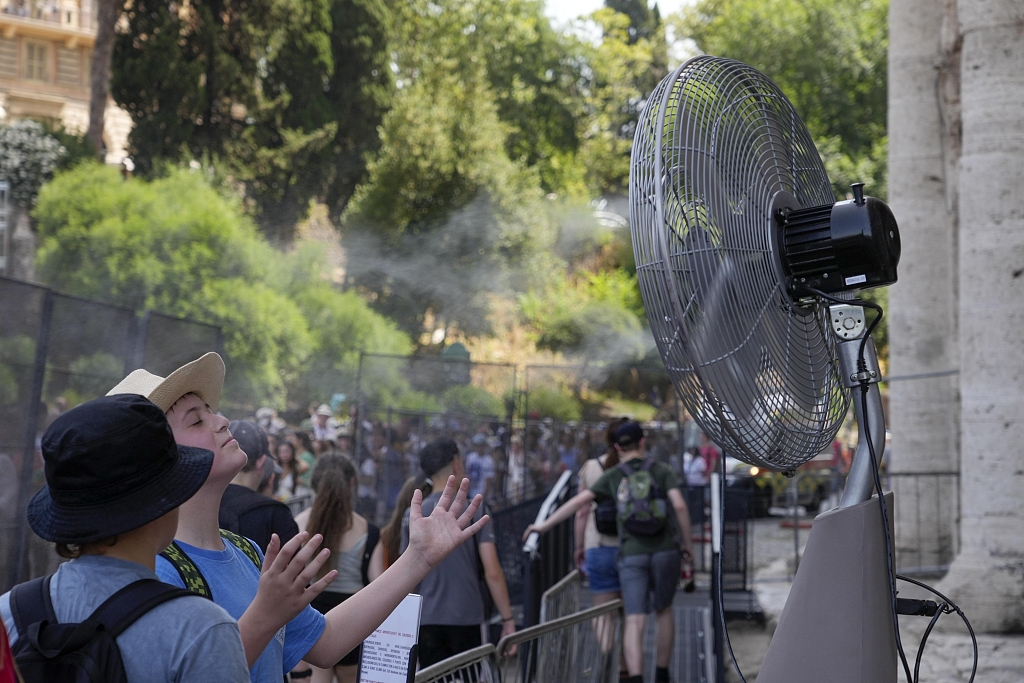Human-induced climate change has played an "absolutely overwhelming" role in the extreme heat waves that have swept across North America, Europe and China this month, according to an assessment by scientists published on Tuesday.
Throughout July, extreme weather has caused havoc across the planet, with temperatures breaking records in China, the United States and southern Europe, sparking forest fires, water shortages and a rise in heat-related hospital admissions.
Over the weekend, thousands of tourists were evacuated from the Greek island of Rhodes to escape wildfires caused by a record-breaking heat wave.

Tourists cool off near a fan as they queue to enter Rome's Colosseum, Italy, on July 18, 2023. /VCG
Tourists cool off near a fan as they queue to enter Rome's Colosseum, Italy, on July 18, 2023. /VCG

A girl drinks water from a public fountain tap in Madrid, Spain, Tuesday, July 18, 2023. /VCG
A girl drinks water from a public fountain tap in Madrid, Spain, Tuesday, July 18, 2023. /VCG

A pharmacy's sign indicates a temperature of 46 degrees Celsius in Rome, Italy, on July 18, 2023. /VCG
A pharmacy's sign indicates a temperature of 46 degrees Celsius in Rome, Italy, on July 18, 2023. /VCG
Without human-induced climate change, the events this month would have been "extremely rare," according to a study by World Weather Attribution, a global team of scientists that examines the role played by climate change in extreme weather.
"European and North American temperatures would have been virtually impossible without the effects of climate change," said Izidine Pinto of the Royal Netherlands Meteorological Institute, one of the study's authors, during a briefing with journalists. "In China, it was around 50 times more likely to happen compared to the past."
The World Weather Attribution team estimated that rising greenhouse gas concentrations made the European heat wave 2.5 Celsius (4.5 Fahrenheit) hotter than it would otherwise have been. They also drove up the North American heat wave by 2 degrees Celsius and the one in China by 1 degree Celsius.
As well as directly impacting human health, the heat has caused large-scale crop damage and livestock losses, the scientists said, with U.S. corn and soybean crops, Mexican cattle, southern European olives and Chinese cotton all severely affected.
El Nino probably contributed to the additional heat in some regions, but rising greenhouse gases were the major factor, the scientists said, and heat waves will become increasingly likely if emissions are not slashed.
They estimated that prolonged periods of extreme heat were likely to hit every two to five years if average global temperatures rose 2 degrees Celsius above pre-industrial levels. Average temperatures are currently estimated to have risen by more than 1.1 degrees Celsius.
"The events we have looked at are not rare in today's climate," said Friederike Otto, a scientist with the Grantham Institute for Climate Change in London, speaking at the briefing. "It's not surprising, from a climatological point of view, that these events are happening at the same time."
"As long as we keep burning fossil fuels, we will see more and more of these extremes," she said. "I don't think there's any stronger evidence that any science has ever presented for a scientific question."
(All images via VCG)
(If you have specific expertise and want to contribute, or if you have a topic of interest that you'd like to share with us, please email us at nature@cgtn.com.)
Source(s): Reuters